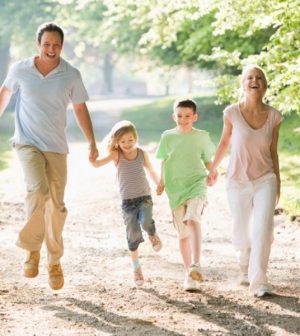- 8 Ways to Increase Dopamine Naturally
- 7 Best Breads for Maintaining Stable Blood Sugar
- Gelatin vs. Collagen: Which is Best for Skin, Nails, and Joints?
- The Long-Term Effects of Daily Turmeric Supplements on Liver Health
- Could Your Grocery Store Meat Be Causing Recurring UTIs?
- Are You Making This Expensive Thermostat Error This Winter?
- Recognizing the Signs of Hypothyroidism
- 10 Strategies to Overcome Insomnia
- Could Artificial Sweeteners Be Aging the Brain Faster?
- Techniques for Soothing Your Nervous System
It’s ‘Kids to Parks Day’: Get Out, Get Active

It’s a good idea to get children outside every day, but especially on Kids to Parks Day, a national day of outdoor play on May 21.
“Even as the COVID-19 pandemic continues, outdoor time and nature exploration are safe for most kids,” pediatrician Dr. Danette Glassy said in an American Academy of Pediatrics (AAP) news release.
“And we know that the more time a child spends in nature, the more likely they are to grow up to be good stewards of our planet — an environmental win!” the Mercer Island, Wash., doctor said.
You don’t have to go far to find places to enjoy the outdoors. Check for parks close to you. Other options include school playgrounds or even your own backyard.
“Take advantage of the power of playing in nature — near your home or neighborhood, or wherever you feel comfortable,” Seattle pediatrician Dr. Pooja Tandon said. “Remember to dress appropriately for the weather. It’s also a good idea to wash hands or use hand sanitizer during and after your adventure.”
More outdoor time for children is associated with improved motor development and lower obesity rates and nearsightedness risk, according to the AAP. And safely getting some sun also helps the body produce vitamin D that’s needed to stay healthy and strong.
Playing outside promotes curiosity, creativity and critical thinking in children, and research shows that children who spend more time in nature exploration do better at learning.
Another benefit is that children have less anger and aggression when they spend time in natural spaces, which can also improve their focus and reduce symptoms of attention-deficit/hyperactivity disorder, the pediatricians’ group says.
The earlier you introduce your baby to nature, the more likely they are to develop a lifelong love of the outdoors, according to the AAP. Put them in strollers or carriers to wander among trees or put them on a blanket and let them enjoy the breeze, bird song, plant textures and forest smells.
With young children, go exploring and talk with them about what’s around you to help them learn new words and engage all their senses.
But don’t feel you must walk miles to reap benefits: You can read to your child outdoors or make nature sculptures by sticking twigs, leaves, cones, rocks and other items into a play dough base. Or just let your child play in mud with old pots, pans, utensils and household tools to develop senses and motor skills.
If you have older children and teens, bond over outdoor games and activities, the experts suggest. Bring a soccer ball or frisbee, and pack a picnic to enjoy with family or friends. It’s a fun break for children and teens and is good for their physical and mental health.
More information
For more on the importance of family time outdoors, go to the Children & Nature Network.
SOURCE: American Academy of Pediatrics, news release, May 11, 2022
Source: HealthDay
Copyright © 2026 HealthDay. All rights reserved.










